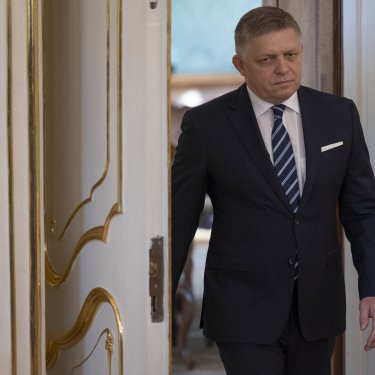Slovakia: Concerned about strong political pressures on journalism, RSF joins a new support institution

The ruling majority led by Prime Minister Robert Fico has attacked journalists, restricted access to information and questioned the independence of the public media. In the new state-run platform for press freedom, Reporters Without Borders (RSF) will hold Slovakia responsible for respecting its international commitments.
Created by the former culture minister, Slovakia’s new Platform for the promotion of press freedom and safety of journalists held its first session on 8 November. Although the consultative body dedicated its kick-off meeting mostly to procedural issues, it adopted a statement emphasizing “the need to achieve full justice in the case of assassination of journalist Jan Kuciak and his fiancée Martina Kusnirova as an important precondition for improving safety of journalists and media freedom in Slovakia.” The declaration also called for “strengthening the guarantees of independence of [the public broadcaster] RTVS based on, among others, the 2022 rule of law report of the European Commission.”
In the Jan Kuciak case, a new appeal decision is due in the upcoming months after the first-instance court acquitted for the second time Marian Kocner, the businessman prosecuted for ordering the 2018 murder. In addition to impunity, press freedom in Slovakia has been challenged - before and after the September election – by current ruling parties' attempts to undermine independent reporting.
“RSF will use the platform to hold Slovakia accountable for respecting its commitments within the international framework of rule of law. The statement approved by the members of the body provides a good starting point for a serious discussion towards the implementation of the European standards of press freedom. It would be reassuring if the upcoming government programme was drafted in the same spirit. In any case, at a time when media freedom in Slovakia faces strong political headwinds again, our organisation will use all means, including a dialogue with the national authorities, to defend trustworthy journalism.
Composed of representatives of relevant state institutions, regulatory and self-regulatory bodies, but also of media and press freedom organisations including the Investigative Centre of Jan Kuciak (ICJK) and RSF, the platform is, according to its statute, “a permanent expert coordinating body for the implementation of commitments arising from international and national initiatives in support of press freedom and the protection of journalists.” Created in connection with the Council of Europe's new campaign for safety of journalists, the platform also fulfills a recommendation of the European Commission for a structural dialogue between state and journalistic community. As a member of the body and in convergence with its long-term objectives in Slovakia, RSF will continue advocating for full justice for crimes committed against journalists, for the independence of the public media, and for the implementation of the recommendations of the European Commission on safety of journalists and against gag lawsuits, all in line with the rule of law reports of the European Commission.
But Slovakia’s new ruling parties don’t seem to have embraced that kind of approach yet.
New political pressures on journalists
While the European Commission’s rule of law report hailed in July 2022 “some progress” in strengthening the independence of the public broadcaster in the previous years, the new ruling coalition baselessly accuses RTVS of bias. On 6 November, barely ten days after taking power, Prime Minister Robert Fico said RTVS had “rarely” played the role of a public service media. His pledge from last February to “go after” the public media’s director general has been echoed by his ruling majority’s ongoing discussion about separating the media into radio and television companies, which would effectively allow removing its current leadership.
A day after making disregarding statements about RTVS, the prime minister attacked the biggest private channel Markiza, the dailies Sme and Dennik N, and the online outlet of the late Kuciak, Aktuality.sk. In a dedicated video, Fico labeled them several times as “hostile” due to their criticism of his policy on the war in Ukraine and admitted “thinking about what the point is in talking to them and providing them with information”. In fact, all four media’s questions have regularly been ignored at press conferences of Fico’s party, Smer-SSD, and of the junior coalition party, SNS. During the election campaign, Fico boycotted Markiza’s debates and SNS refused interview requests from the three print and online media. Even more worryingly, the current prime minister suggested – before and after the recent elections – that the journalists of Sme, Dennik N and Aktuality.sk, who investigated corruption linked to Smer, should face criminal prosecution for their work.
During that period, serious verbal and online threats targeting Slovak journalists have multiplied, according to the data of the non-governmental platform Safe.Journalism.sk, established by ICJK with the support of RSF.
Slovakia is ranked 17th out of 180 countries in RSF’s 2023 World Press Freedom Index.
